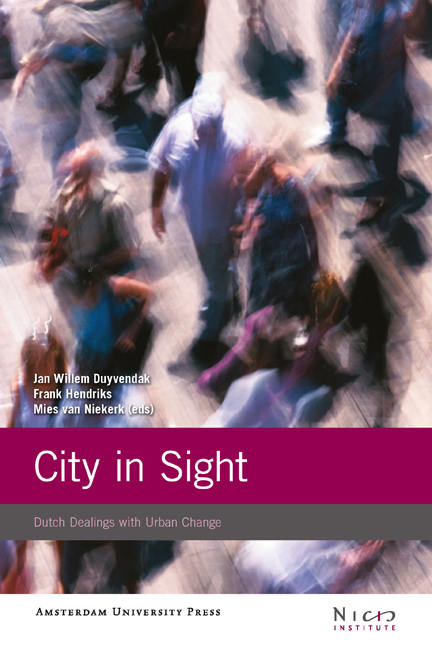Book contents
- Frontmatter
- Contents
- Acknowledgements
- Cities in Sight, Inside Cities: An Introduction 9
- Part I Urban Transformations and Local Settings
- Part II Urban Citizenship and Civic Life
- Part III Urban Governance and Professional Politics
- The Dutch Orange and the Big Apple: A Comparative Commentary
- References
- Notes on Contributors
- Index
4 - Problematic Areas or Places of Fun? Ethnic Place Marketing in the Multicultural City of Rotterdam
Published online by Cambridge University Press: 19 January 2021
- Frontmatter
- Contents
- Acknowledgements
- Cities in Sight, Inside Cities: An Introduction 9
- Part I Urban Transformations and Local Settings
- Part II Urban Citizenship and Civic Life
- Part III Urban Governance and Professional Politics
- The Dutch Orange and the Big Apple: A Comparative Commentary
- References
- Notes on Contributors
- Index
Summary
Introduction
Concentrations of ethnic businesses in deprived areas were until recently mostly seen as isolated phenomena. Ignored by mainstream consumers, and internally competing for local customers with the same ethnic background, ethnic entrepreneurs had their own culturally determined parallel economies. However, things have changed. The rise of a symbolic economy (Zukin, 1995) has opened up break-out perspectives for multi-ethnic neighborhoods as sites of leisure and consumption. In this context ethnic entrepreneurs have the opportunity to move beyond small-scaled local demand and supply by actively making use of the ‘exotic’ and ‘ethnic’ symbols available to them (Light & Rosenstein 1995). In Anglo-Saxon countries multi-ethnic neighborhoods are already well known attractions for a broad scope of visitors, residents and tourists. Just think about the manifold Chinatowns in cities all over the world (San Francisco, Boston, Toronto, Vancouver, Sydney, Melbourne, Liverpool, and London), Little Italy in New York or the Balti Triangle in Birmingham: locations that are described in tourist guides and appeal to a wide audience.
Since the rise of the symbolic economy, government policies have also started to promote culture in a different way than in the past. Governmental support of culture is seen as a way to boost the economy, to improve the quality of life and as a way to improve the reputation of a place and as a catalyzer for urban regeneration. The ethnic ‘fingerprint’ of a city (or a specific neighborhood) can be part of this cultural palette. In Anglo-Saxon countries, vivid ethnic zones are increasingly promoted by city governments as key components in urban revitalization and place marketing strategies (Page & Hall 2003: 2). Ethnic local diversity has also become an important part of bidding strategies for major conferences and sporting events like the Olympic Games (Garcia 2001). In Europe this commercial ‘commodification of the ethnic Other’ (Anderson 1990; Conforti 1996; Lin 1998) is so far a less well-known development. Ethnic entrepreneurs are in general mostly type-casted as low skilled and low-earning. Ethnic city areas are often still considered as not interesting enough for a broader audience (Bodaar & Rath 2006).
- Type
- Chapter
- Information
- City in SightDutch Dealings with Urban Change, pp. 81 - 100Publisher: Amsterdam University PressPrint publication year: 2009
- 1
- Cited by



